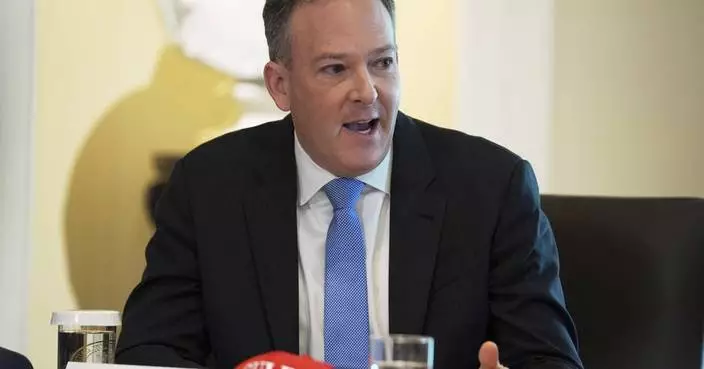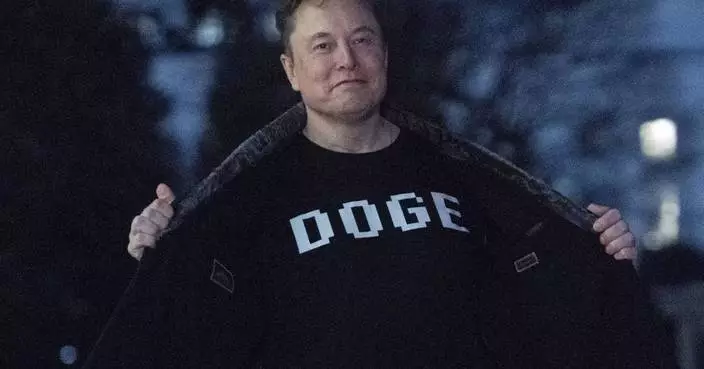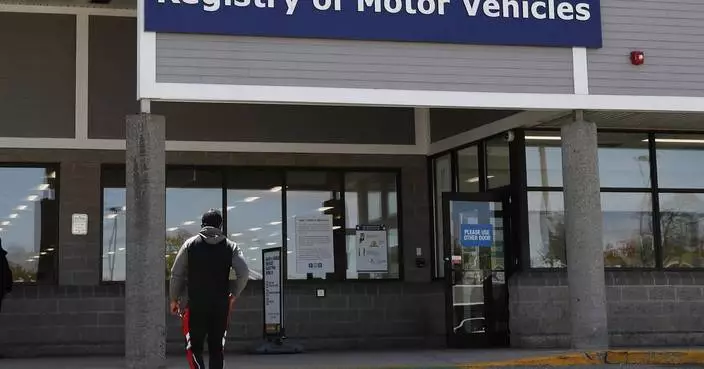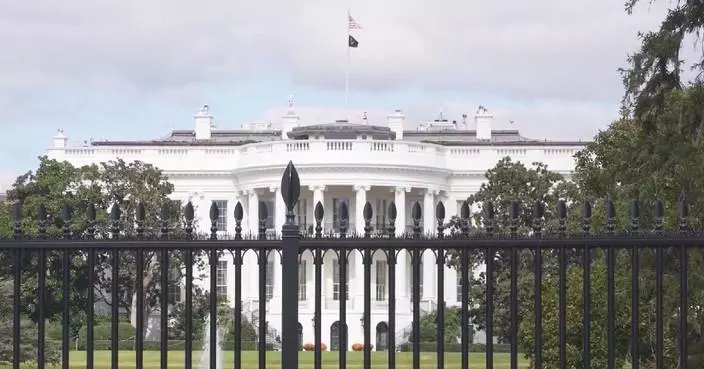LOS ANGELES (AP) — After a second offseason of financial discontent, Matthew Stafford is glad to be back at work with the Los Angeles Rams.
The Super Bowl-winning quarterback attended the start of the Rams' voluntary offseason workout program Monday several weeks after getting a substantial raise on the contract extension he received three years ago when the Rams won it all. Stafford got a restructured deal for the second straight offseason after challenging the Rams for better terms.
The 37-year-old Stafford didn't go into many details about the standoff, which was much shorter this season after it stretched up to the start of training camp in 2024. The quarterback also acknowledged he did “due diligence” on potential landing spots in a trade before the Rams gave him what he wanted.
“There’s so many positive things about our organization, about our team," Stafford said. "Never really wanted to leave, so just happy to be back and happy that the Rams want me back, and hopefully we can move forward and have a great season.”
Stafford, who began his career with 12 years in Detroit, will play his fifth season in Los Angeles after strongly considering the possibility of starting over elsewhere.
The sides have gently downplayed the seriousness of their negotiations, with coach Sean McVay saying that he never seriously thought Stafford would leave. But Stafford definitely thought about it: His agent got permission from the Rams to gauge the quarterback's potential value in a trade, and Stafford was quickly linked to theoretical deals with the Raiders and Giants.
“I think anytime those kind of things come up, you’re obviously doing due diligence and looking around,” Stafford said. “You obviously poke your head around and see what’s going on. Obviously, wanting to be back with the Rams was my No. 1 priority, so I’m glad it worked out and I don’t have to worry about it.”
Heading into his 17th NFL season, Stafford has made it clear he will decide his future on a year-to-year basis from here on out, and the Rams seem content with that — for 2025, at least.
There's also the distinct possibility that the Rams will attempt to draft their quarterback of the future this week, either with the 26th overall pick or by moving up.
If that happens, Stafford said it wouldn't change the way he approaches the season.
“Whoever we draft, I hope they come in and help our team win,” Stafford said. “You look at it last year, our first two picks were guys on defense that made huge impacts on our team. So for me, I’m just trying to load this team up with as many good players as we possibly can. If a quarterback comes along and they feel the need to take him, (I'd) welcome him with open arms and try to teach him as much as I possibly can.”
Stafford will have the entire offseason program to forge a bond with Davante Adams, his longtime rival in the NFC North. The star receiver signed a two-year deal last month with the Rams, who also released Super Bowl MVP Cooper Kupp, Stafford's longtime favorite target.
“He’s been an unbelievable player for a long time,” Stafford said of Adams. “Obviously had a special connection with Aaron (Rodgers) there in Green Bay for a long time, which was great to watch as long as I wasn’t on the other sideline watching it. … Great hands. Can finish plays down the field with scores as well. I’m excited to get to work with him. I’ve been a fan of his for a long time as a player, so hopefully I can give him the rock and he can do his thing.”
Stafford's return cements the Rams' chances to be a Super Bowl contender again this season after winning the NFC West and narrowly losing to Philadelphia in last season's playoffs. That stability behind center — whether that center is incumbent Beaux Limmer or returning free agent Coleman Shelton — will allow the Rams to conduct their offseason with no worries about late-summer surprises.
“It's huge,” right tackle Rob Havenstein said. “Having (No.) 9 in the building is always a good thing.”
AP NFL: https://apnews.com/NFL

FILE - Los Angeles Rams quarterback Matthew Stafford warms up before an NFL football NFC divisional playoff game against the Philadelphia Eagles on Jan. 19, 2025, in Philadelphia. (AP Photo/Derik Hamilton, File)
WASHINGTON (AP) — The White House released President Donald Trump's 2026 budget proposal Friday, hoping to slash, if not zero out, spending on many government programs. It seeks a sweeping restructuring of the nation’s domestic priorities, reflective of the president’s first 100 days in office and sudden firing of federal workers.
Trump's plan aims for steep cuts to child care, disease research, renewable energy and peacekeeping abroad, many already underway through Elon Musk’s Department of Government Efficiency, all while pumping up billions for the administration's mass deportation agenda.
The budget drafters echo Trump’s promises to end “woke programs,” including preschool grants to states with diversity programs. And they reflect his vow to stop the “weaponization of government” by slashing the Internal Revenue Service, even as critics accuse him of using the levers of power to punish people and institutions he disfavors
Overall, it’s a sizable reduction in domestic accounts — some $163 billion, or 22.6% below current year spending, the White House said.
At the same time, the White House said it is relying on Congress to unleash $375 billion in new money for for the Homeland Security and Defense departments as part of Trump’s “big, beautiful bill” of tax cuts and spending reductions. His goal is to repel when he calls a “foreign invasion," though migrant arrivals to the U.S. are at all-time lows.
House Speaker Mike Johnson welcomed the proposal as “a bold blueprint that reflects the values of hardworking Americans and the commitment to American strength and prosperity.”
Budgets do not become law, but serve as a touchstone for the coming fiscal year debates. Often considered a statement of values, this first budget since Trump's return to the White House carries the added weight of defining the Republican president's second-term pursuits, alongside his party in Congress.
It comes as Trump has unilaterally imposed what could be hundreds of billions of dollars in tax increases in the form of tariffs, setting off a trade war that has consumers, CEOs and foreign leaders worried about a possible economic downturn.
Democrats assailed the budget as a devastating foreshadowing of Trump's vision for the country.
“President Trump has made his priorities clear as day: he wants to outright defund programs that help working Americans," said Sen. Patty Murray of Washington, the top Democrat on the Appropriations Committee. This, she said, “while he shovels massive tax breaks at billionaires like himself and raises taxes on middle-class Americans with his reckless tariffs.”
The White House Office of Management and Budget, headed by Russell Vought, a chief architect of Project 2025 from the conservative Heritage Foundation, provided contours of a so-called skinny version of topline numbers only.
It covers only the federal government's discretionary spending, now about $1.83 trillion a year on defense and nondefense accounts. Trump's team drops that spending by $163 billion, to $1.69 trillion, a portion of the nation's nearly $7 trillion budget that includes far more programs and services.
Federal budgets have been climbing steadily, as have annual deficits that are fast approaching $2 trillion with annual interest payments on the debt almost $1 trillion. That’s thanks mostly to the spike in emergency COVID-19 pandemic spending, changes in the tax code that reduced revenues and the climbing costs of Medicare, Medicaid and other programs, largely to cover health needs as people age. The nation’s debt load, at $36 trillion, is ballooning.
“We need a budget that tells the full story, and it should control spending, reduce borrowing, bring deficits down,” said Maya MacGuineas, president of the Committee for a Responsible Federal Budget, a fiscal watchdog group.
Among some of the White House's proposed highlights:
The State Department and international programs would lose 84% of their money and receive $9.6 billion, reflecting deep cuts already underway, including to the U.S. Agency for International Development.
The Health and Human Services Department would be cut by $33.3 billion and the Education Department’s spending would be reduced by $12 billion. The Centers for Disease Control and Prevention and the National Institutes of Health would all face steep reductions.
The Defense Department would get an additional $113.3 billion and Homeland Security would receive $42.3 billion more. Much of that is contingent on Congress approving Trump's big bill. That approach drew criticism from leading defense hawks, among them the former GOP Leader, Sen. Mitch McConnell of Kentucky.
McConnell called the proposed boost in defense money in the president's budget a “gimmick."
“America cannot expect our allies to heed calls for greater annual defense spending if we are unwilling to lead by example," McConnell said in a blistering statement. "Fortunately, Presidential budget requests are just that: requests. Congress will soon have an opportunity to ensure that American power – and the credibility of our commitments – are appropriately resourced."
It's Congress, under its constitutional powers, that decides the spending plans, approves the bills that authorize federal programs and funds them through the appropriations process. Often, that system breaks down, forcing lawmakers to pass stopgap spending bills to keep the government funded and avoid federal shutdowns.
Congress is already deep into the slog of drafting of Trump’s big bill of tax breaks, spending cuts and bolstered funds for the administration’s mass deportation effort — a package that, unlike the budget plan, would carry the force of law.
Vought is also expected on Capitol Hill in the weeks ahead as the Trump administration presses its case.
Among the more skilled conservative budget hands in Washington, Vought has charted a career toward this moment. He served during the first Trump administration in the same role and, for Project 2025, wrote an extensive chapter about the remaking of the federal government.
Vought has separately been preparing a $9 billion package that would gut current 2025 funding for the U.S. Agency for International Development and the Corporation for Public Broadcasting, which involves the Public Broadcasting Service and National Public Radio. Trump signed an executive order late Thursday that instructs the Corporation for Public Broadcasting and federal agencies to cease funding for PBS and NPR.
Vought has said that a package of so-called budget rescissions would be a first of potentially more, as the Trump administration tests the appetite in Congress for lawmakers to go on record and vote to roll back the money.
This story has been corrected to reflect that the administration is proposing to cut the Health and Human Services budget by $33.3 billion, not $33.3 trillion.
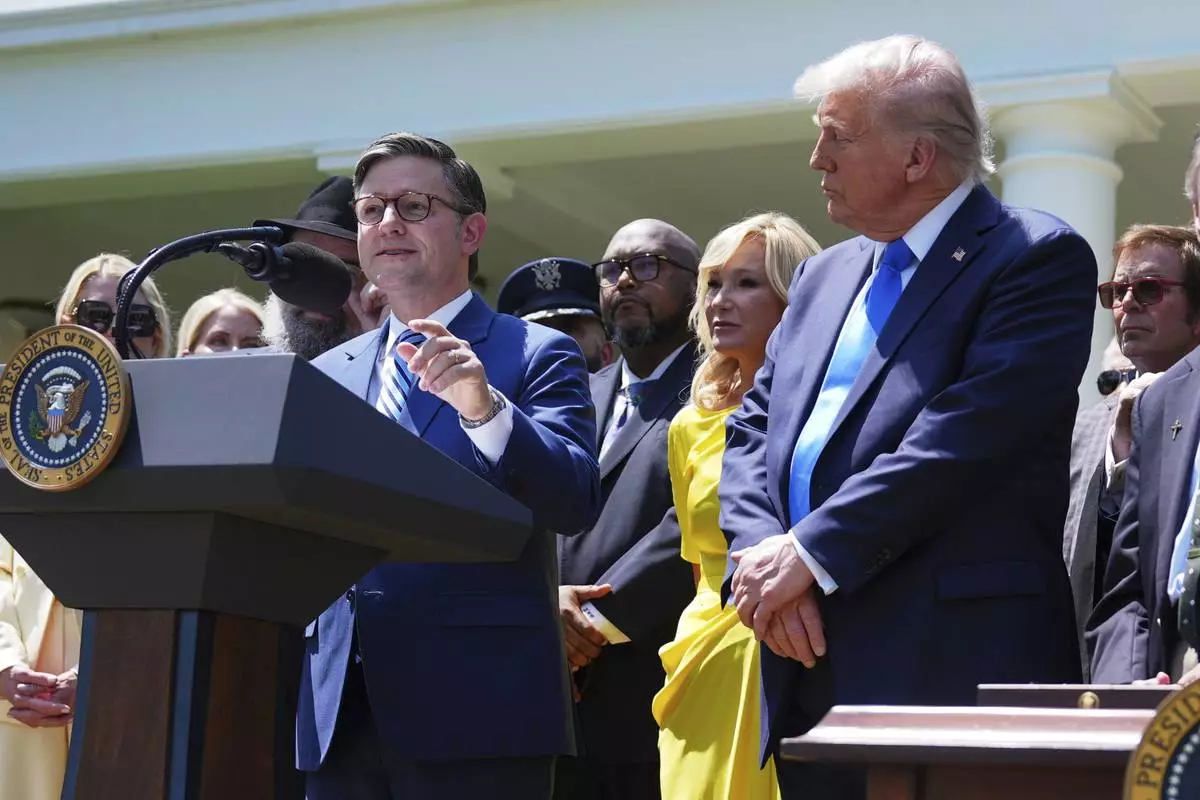
House Speaker Mike Johnson, R-La., speaks as President Donald Trump, right, listens during a National Day of Prayer event in the Rose Garden of the White House, Thursday, May 1, 2025, in Washington. (AP Photo/Evan Vucci)
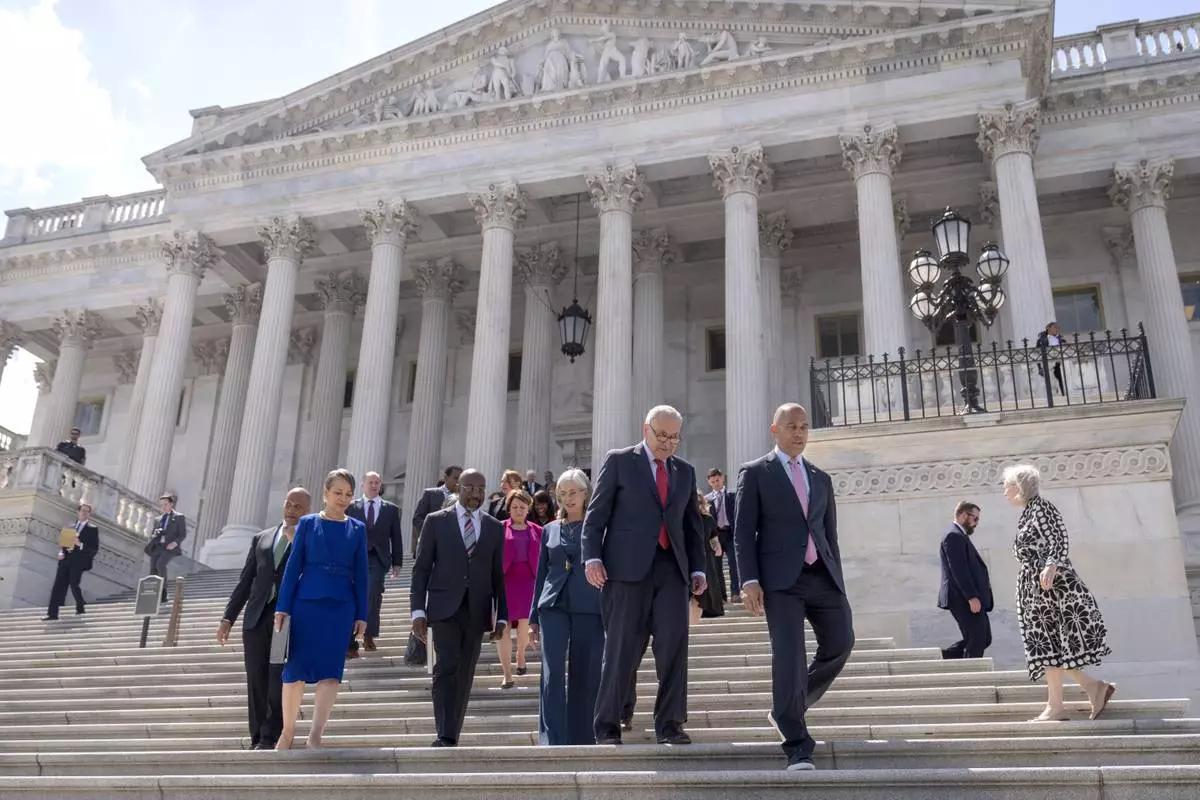
Senate Minority Leader Chuck Schumer, of N.Y., second from right, and House Minority Leader Hakeem Jeffries, of N.Y., right, arrive with other House and Senate Democrats for an event to mark 100 days of President Donald Trump's term on the steps of the Senate on Capitol Hill, Wednesday, April 30, 2025, in Washington. (AP Photo/Mark Schiefelbein)
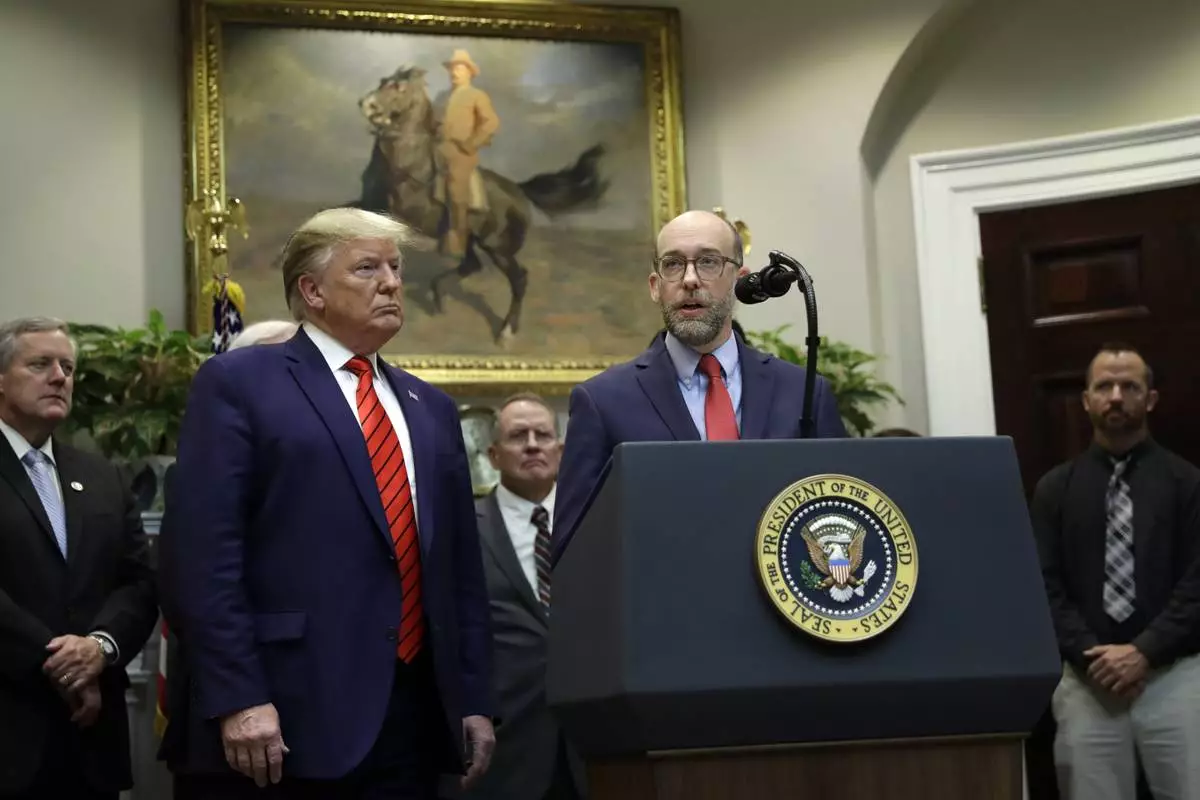
FILE - President Donald Trump listens as acting director of the Office of Management and Budget Russ Vought speaks during an event on "transparency in Federal guidance and enforcement" in the Roosevelt Room of the White House, Oct. 9, 2019, in Washington. (AP Photo/Evan Vucci, File)








